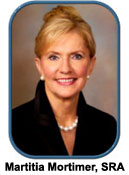|
COMMERCIAL CREDIT CRISIS ENDANGERS RECOVERY
 An area hit hard by the economic crisis and the resulting
credit crunch is commercial real estate. Loans involving
commercial real estate are generally shorter than their
residential counterparts and are typically refinanced as they
become due. The credit crisis that hit last year has led to
commercial lenders being less willing to refinance. If this
situation is not resolved there could be a wave of defaults in
the next couple of years adding a double whammy to an economy
that is suffering enough as it is. An area hit hard by the economic crisis and the resulting
credit crunch is commercial real estate. Loans involving
commercial real estate are generally shorter than their
residential counterparts and are typically refinanced as they
become due. The credit crisis that hit last year has led to
commercial lenders being less willing to refinance. If this
situation is not resolved there could be a wave of defaults in
the next couple of years adding a double whammy to an economy
that is suffering enough as it is.
The National Association of Realtors (NAR) is pointing out
commercial real estate’s importance to the entire economy and
the need to ease credit restrictions on this critical segment
of the market.
“Most lenders have withdrawn from the market, and there is no
secondary market for commercial mortgages,” NAR President
Charles McMillan said. “If lenders cannot meet the growing
demand for credit to refinance performing commercial real
estate loans, which are due to mature soon, a wave of defaults
could worsen the current credit crisis.”
According to NAR, there is currently about $5 trillion worth
of income-producing commercial property in the United States.
This sector provides for more than 9 million jobs, as well as
millions of dollars in tax revenue. While these taxes help out
the federal and state governments, local governments
collectively depend on commercial property taxes for about 70%
of their revenue.
“Commercial real estate creates the framework for much of what
happens in our economy,” Realtors Commercial Alliance Chairman
Robert Toothaker said. “A major collapse in this area would be
felt throughout the economy.”
TALF TO INCLUDE COMMERCIAL
REAL ESTATE IN RESCUE PACKAGE
In an effort to curb the developing crisis
mentioned in the above article, the U.S. Treasury announced on
February 12 that commercial mortgage-backed securities are now
eligible collateral for the Term Asset-Backed Loan Facility,
better known as TALF.
TALF was created last November by the Federal Reserve Board in
an effort to stimulate the credit flow following the economic
downturn. At the time of creation, TALF authorized the Federal
Reserve Bank of New York to lend up to $200 billion to holders
of AAA-rated asset-backed securities collateralized by credit
card loans, automobile loans, student loans and loans
guaranteed by the Small Business Administration. The National
Association of Realtors (NAR), through its subsidiary,
Realtors Commercial Alliance (RCA), has been advocating the
inclusion of commercial mortgage-backed securities in the
group of loan securities backed by TALF.
“Expanding the TALF and opening it up to commercial
mortgage-backed securities is a movement in the right
direction and welcome news for the American economy,” said NAR
President Charles McMillan.
“Though much still remains to be done, this policy decision
will help reassure investors in the vital commercial real
estate sector,” added RCA Chairman Robert Toothaker. “NAR will
continue to work with Congress and the regulatory agencies as
further options are considered to address the crisis in the
credit market and ensure overall economic recovery.”
 HOUSING
HAS BEEN THROUGH TOUGHER TIMES HOUSING
HAS BEEN THROUGH TOUGHER TIMES
For most of us, the recent period has seen the
biggest drop in housing values during our lifetime. Recent
figures released by the Winans International Real Estate Index
indicated that new U.S. home prices were down 23% from what
they were in March 2007.
While this period of housing-value decline is probably not yet
over, the Winans report said that housing prices declined 68
percent from 1929 until 1932. Not so coincidentally, those
Great Depression years are when real-estate-appraisals became
a standard part of the mortgage loan process. The appraisal
profession was strengthened somewhat when state-appraiser
licensing became mandatory during the late 1980s in the wake
of the Savings and Loan Crisis.
Now that we are undergoing another real-estate-related
economic crisis, more teeth are being put into the
appraisal-independence mandates via the Home Valuation Code of
Conduct. Appraisers must be responsible, professional and free
of any influence to place a certain value on property for us
to avoid further serious housing related economic problems in
the future.
ALL FHA APPRAISERS MUST BE
CERTIFIED BY OCTOBER
The U.S. Department of Housing and Urban
Development (HUD) is raising the standards it requires for an
appraiser to be qualified to perform appraisals on FHA home
loans. In the past, FHA-approved appraisers had to be state
licensed appraisers, but they did not have to be state
certified.
That is beginning to change. Last October HUD stopped
accepting FHA-approval applications from appraisers who did
not have state certification. Non-certified appraisers who are
currently FHA approved have until October 1 of this year to
obtain state certification. If they fail to do so, they will
be dropped from the FHA-approved appraiser roster. On that
same date, all FHA-approved lenders will be required to use
state certified appraisers on loans involving FHA-insured
mortgages. The appraisers must be certified in the state where
the property involved in the mortgage is appraised.
ELLIOTT® can get its clients appraisals from FHA-approved
appraisers anywhere in the United States. We constantly
monitor the status of all of our appraisers and maintain
records of which FHA appraisers are certified and which ones
need to obtain certification by October.
FOREIGN INVESTORS RANK USA AS
MOST SECURE
 Most
members of the Association of Foreign Investors in Real Estate
(AFIRE) rank real estate in the United States No. 1 in secure
property investment. An AFIRE membership survey, conducted
late last year revealed that 53% of its members listed the USA
as the “2008 Country providing the most stable and secure real
estate investments." Most
members of the Association of Foreign Investors in Real Estate
(AFIRE) rank real estate in the United States No. 1 in secure
property investment. An AFIRE membership survey, conducted
late last year revealed that 53% of its members listed the USA
as the “2008 Country providing the most stable and secure real
estate investments."
“Our investor members have expressed a growing
confidence and interest in U.S. real estate,” said AFIRE CEO
James Fetgatter. “Their investment plans for 2009 for the U.S.
resemble the flight to quality that is creating the demand for
U.S. Treasuries."
Although AFIRE has less than 200 members, they collectively
own about $1 trillion worth of real estate, over a third of
which is in the United States. The survey also indicated that
foreign lenders plan to increase lending by 58% in the USA
during 2009.
“During the past year, AFIRE members generally took a measured
stance towards new acquisitions,” said AFIRE Chairman MacLaine
Kenan. “As they expect more favorable investment fundamentals
to return in 2009, our members are posed to move more
aggressively on acquisitions.”
MARKET FOR
MEDICAL OFFICE SPACE REMAINS HEALTHY
Despite the difficult
economic climate for commercial real estate, as well as other
facets of the economy, the medical office business appears to
be weathering the storm.
“There certainly are investors who want this type of property
in their portfolio,” Dan Fasulo, managing director of Real
Capital Analytics, said of medical offices. "It’s kind of a
recession-proof bet.”
Sources, including the National Association of Realtors and
the New York Times, indicate that real estate investors who
deal in such property tend to have better access to credit
than their non-medical counterparts. Doctors are, on the
whole, considered less likely to move than other commercial
tenants. Health care is also an industry where jobs are
increasing, even during this period of economic downturn.
“There is still real leverage out there,” Neil Shapiro, who
heads the health-care finance group of the New York law firm,
Herrick Feinstein. “There is still the ability to get these
deals done, versus a standard office building or shopping
center.”
ELLIOTT® regularly performs appraisals and other real estate
services on doctors offices, dentists offices, hospitals,
nursing homes and other health care facilities.
ASK MARTITIA

QUESTION: Is there a guideline or standard regarding
the use of MLS photos for comparables in an appraisal?
MARTITIA: Uniform
Standards of Appraisal Practice (USPAP) does not specifically
address the use of MLS photographs in an appraisal report, but
it does specify that the appraiser cannot use false or
misleading information in an appraisal. It is best that the
appraiser use his or her own photographs in an appraisal
report, taken during the inspection, but sometimes
circumstances prevent this from happening. If a source other
than appraiser is used to provide photos, the source should be
identified in the report, and the date of the photos should
also be identified if possible. If an appraiser included some
older photos, without explanation, of parts of the property
that since had been damaged or altered, the appraiser would be
in violation of USPAP.
Martitia Mortimer, Elliott’s executive vice president, answers
appraisal questions on a regular basis in Elliott Real Estate
News.
QUOTES
 “An
intellectual is a man who takes more words than necessary to
tell more than he knows.” “An
intellectual is a man who takes more words than necessary to
tell more than he knows.”
-- Dwight Eisenhower
“Life is the art of drawing without an eraser.” -- John
Gardner
“There is only one boss; the customer. He can fire everybody
in the company, from the chairman on down, simply by spending
his money somewhere else.” -- Sam Walton
“Treat your password like your toothbrush. Don’t let anybody
else use it, and get a new one every six months.” --
Clifford Stoll
“Why shouldn’t the truth be any stranger than fiction?
Fiction, after all, has to make sense.” -- Mark Twain

 |
|
|
|
Newsletter Editor:
kevin@elliottco.com
|
| |
|
3316-A
Battleground Avenue
Greensboro, NC 27410 |
Toll
Free 800-854-5889
Fax 336-854-7734 |
| |
|
If you wish to be REMOVED from our
e-mail list
click
here. |
|









